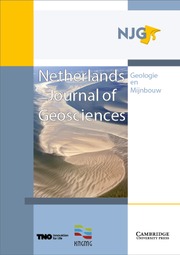Crossref Citations
This article has been cited by the following publications. This list is generated based on data provided by
Crossref.
Schäfer, A.
and
Siehl, A.
2002.
Preface: Rift tectonics and syngenetic sedimentation - the Cenozoic Lower Rhine Basin and related structures.
Netherlands Journal of Geosciences - Geologie en Mijnbouw,
Vol. 81,
Issue. 2,
p.
145.
Klett, M.
Eichhorst, F.
and
Schäfer, A.
2002.
Facies interpretation from well logs applied to the Tertiary Lower Rhine Basin fill.
Netherlands Journal of Geosciences - Geologie en Mijnbouw,
Vol. 81,
Issue. 2,
p.
167.
Dèzes, P.
Schmid, S.M.
and
Ziegler, P.A.
2004.
Evolution of the European Cenozoic Rift System: interaction of the Alpine and Pyrenean orogens with their foreland lithosphere.
Tectonophysics,
Vol. 389,
Issue. 1-2,
p.
1.
Berger, Jean-Pierre
Reichenbacher, Bettina
Becker, Damien
Grimm, Matthias
Grimm, Kirsten
Picot, Laurent
Storni, Andrea
Pirkenseer, Claudius
Derer, Christian
and
Schaefer, Andreas
2005.
Paleogeography of the Upper Rhine Graben (URG) and the Swiss Molasse Basin (SMB) from Eocene to Pliocene.
International Journal of Earth Sciences,
Vol. 94,
Issue. 4,
p.
697.
Ziegler, P. A.
and
Dèzes, P.
2005.
Evolution of the lithosphere in the area of the Rhine Rift System.
International Journal of Earth Sciences,
Vol. 94,
Issue. 4,
p.
594.
GEE, C. T.
2005.
The Genesis of Mass Carpological Deposits (Bedload Carpodeposits) in the Tertiary of the Lower Rhine Basin, Germany.
PALAIOS,
Vol. 20,
Issue. 5,
p.
463.
Schäfer, A.
Utescher, T.
Klett, M.
and
Valdivia-Manchego, M.
2005.
The Cenozoic Lower Rhine Basin – rifting, sedimentation, and cyclic stratigraphy.
International Journal of Earth Sciences,
Vol. 94,
Issue. 4,
p.
621.
Ziegler, P.A.
and
Dèzes, P.
2007.
Cenozoic uplift of Variscan Massifs in the Alpine foreland: Timing and controlling mechanisms.
Global and Planetary Change,
Vol. 58,
Issue. 1-4,
p.
237.
Cloetingh, S.A.P.L.
Ziegler, P.A.
Bogaard, P.J.F.
Andriessen, P.A.M.
Artemieva, I.M.
Bada, G.
van Balen, R.T.
Beekman, F.
Ben-Avraham, Z.
Brun, J.-P.
Bunge, H.P.
Burov, E.B.
Carbonell, R.
Faccenna, C.
Friedrich, A.
Gallart, J.
Green, A.G.
Heidbach, O.
Jones, A.G.
Matenco, L.
Mosar, J.
Oncken, O.
Pascal, C.
Peters, G.
Sliaupa, S.
Soesoo, A.
Spakman, W.
Stephenson, R.A.
Thybo, H.
Torsvik, T.
de Vicente, G.
Wenzel, F.
and
Wortel, M.J.R.
2007.
TOPO-EUROPE: The geoscience of coupled deep Earth-surface processes.
Global and Planetary Change,
Vol. 58,
Issue. 1-4,
p.
1.
Kemna, Hans Axel
and
Westerhoff, Wim E.
2007.
Remarks on the palynology-based chronostratigraphical subdivision of Pliocene terrestrial deposits in NW-Europe.
Quaternary International,
Vol. 164-165,
Issue. ,
p.
184.
Kemna, H.A.
2008.
A Revised Stratigraphy for the Pliocene and Lower Pleistocene Deposits of the Lower Rhine Embayment.
Netherlands Journal of Geosciences - Geologie en Mijnbouw,
Vol. 87,
Issue. 1,
p.
91.
Luijendijk, E.
Van Balen, R. T.
Ter Voorde, M.
and
Andriessen, P. A. M.
2011.
Reconstructing the Late Cretaceous inversion of the Roer Valley Graben (southern Netherlands) using a new model that integrates burial and provenance history with fission track thermochronology.
Journal of Geophysical Research,
Vol. 116,
Issue. B6,
Orrù, Martino
Grillo, Oscar
Lovicu, Gianni
Venora, Gianfranco
and
Bacchetta, Gianluigi
2013.
Morphological characterisation of Vitis vinifera L. seeds by image analysis and comparison with archaeological remains.
Vegetation History and Archaeobotany,
Vol. 22,
Issue. 3,
p.
231.
Čerňanský, Andrej
Szyndlar, Zbigniew
and
Mörs, Thomas
2017.
Fossil squamate faunas from the Neogene of Hambach (northwestern Germany).
Palaeobiodiversity and Palaeoenvironments,
Vol. 97,
Issue. 2,
p.
329.
Westerhoff, W.E.
Donders, T.H.
Trabucho Alexandre, N.
and
Busschers, F.S.
2020.
Early Pleistocene Tiglian sites in the Netherlands: A revised view on the significance for quaternary stratigraphy.
Quaternary Science Reviews,
Vol. 242,
Issue. ,
p.
106417.
Gies, Hannah
Hagedorn, Frank
Lupker, Maarten
Montluçon, Daniel
Haghipour, Negar
van der Voort, Tessa Sophia
and
Eglinton, Timothy Ian
2021.
Millennial-age glycerol dialkyl glycerol tetraethers (GDGTs) in forested mineral soils: 14C-based evidence for stabilization of microbial necromass.
Biogeosciences,
Vol. 18,
Issue. 1,
p.
189.
Stojakowits, Philipp
and
Mayr, Christoph
2022.
Integrated Quaternary Stratigraphy.
Vol. 7,
Issue. ,
p.
81.


